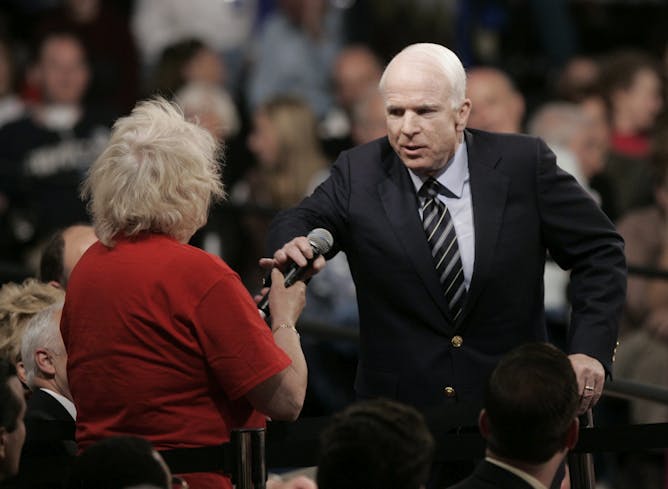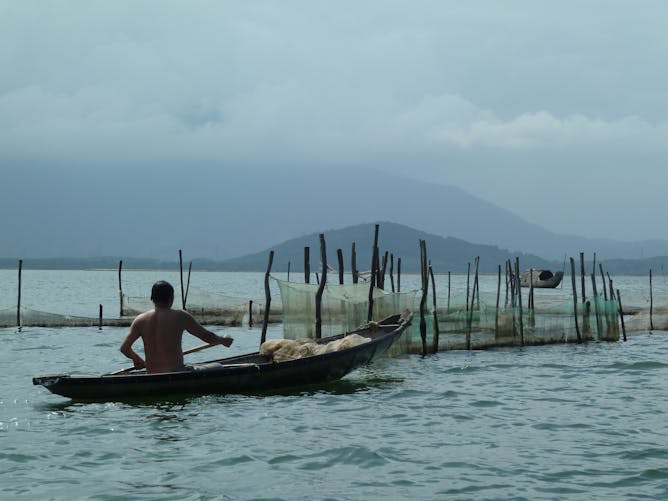|
It was only a decade ago, but in terms of how we’ve regressed politically, it seems so much longer. Today in The Conversation Canada, Alan Sears of the University of New Brunswick looks at how the late John McCain did the right thing in the 2008 U.S. presidential campaign by standing up to some of his own supporters to tell them that Barack Obama was a decent man. What can we all learn from McCain’s willingness to make himself politically vulnerable?
Technology is at the heart of the Fourth Industrial Revolution. Sylvie Albert of the University of Winnipeg says communities and planners need to be better prepared for the rapid technological advances that will have a major impact on how we live our lives.
Stephen Archer of Queen’s University looks at Canada’s systems of health funding, medical training and physician compensation and says overhauls are needed to support vital centres of medical research and complex care.
And finally…a group of Canadian and Vietnamese academics have done research on how small-scale fishers pooled resources to create a fund for micro-loans. There are lessons to be learned from these kind of grassroots innovations for small communities around the world.
Regards,
|

In what became one of the defining moments of his unsuccessful 2008 presidential campaign, Republican candidate John McCain takes back the microphone from Gayle Quinnell, who said Barack Obama “was an Arab.” The moment occurred during a town hall meeting on Oct. 10, 2008, in Lakeville, Minn.
(AP Photo/Jim Mone)
Alan Sears, University of New Brunswick
John McCain did something during the 2008 U.S. presidential election that would seem very out of place today: he made himself vulnerable by speaking up about the character of opponent Barack Obama.
|

Technology and artificial intelligence are already profoundly changing how we live, work and travel. Are we ready for more profound changes?
(Shutterstock)
Sylvie Albert, University of Winnipeg
Technology is already changing how we live our lives and go about our days. Are we ready with collaborative planning processes so we are not taken by surprise by more profound change?
|

A few woefully-funded academic health sciences centres are responsible for providing complex care to patients with life-threatening illnesses as well as training future doctors and testing the latest in new surgical techniques.
(Shutterstock)
Stephen Archer, Queen's University, Ontario
Canada's systems of health funding, medical training and physician compensation need an overhaul – to support vital centres of medical research and complex care.
|

A fisherman checks his fish corral nets in the Cau Hai lagoon, Vietnam.
Mark Andrachuk
Mark Andrachuk, University of Ottawa; Derek Armitage, University of Waterloo; Hoang Dung Ha, Hue University of Agriculture and Forestry; Jessica Blythe, Brock University; Le Van Nam, Hue University of Agriculture and Forestry
When it comes to small-scale fisheries, there is no one route to sustainability. Finding success stories can help map those paths.
|
Arts
|
-
Keith Booker, University of Arkansas; Isra Daraiseh
A lack of respect for history, a population conditioned to consume goods at breakneck pace, and pacification of individuals via an entertainment culture: parts of Huxley's novel strikingly resemble our own world.
|
|
Culture + Society
|
-
Tey Meadow, Columbia University
The signs might be there. But parents and clinicians will still wonder if there's some foolproof way to determine whether their children are actually trans. There isn't one – and that's okay.
|
|
Science + Technology
|
-
Catherine Loveday, University of Westminster
The risk smartphones pose to our memory is overblown, but they do get in the way of us making more detailed and authentic memories.
|
|